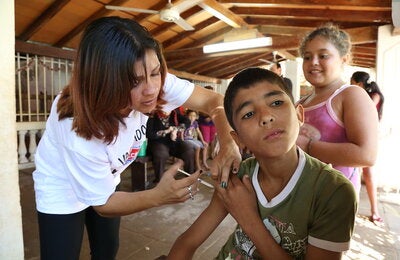PAHO gathers information on the health situation and application of ICTs in 47 countries and territories of the region.
Washington, DC, 5 May 2017 (PAHO/WHO)- Information on the health situation and the use of information and communication technologies (ICTs) in the Americas now has a new home. The Pan American Health Organization has launched a virtual directory of digital health, or eHealth, profiles that includes data and statistics from 47 countries and territories in the Americas.
The profiles detail the health situation of each country, e.g., basic indicators, life expectancy and total expenditure on health per capita, among others, all in one place. They also feature the degree of countries' development in digital health, as compiled by the World Health Organization (WHO) Global eHealth Observatory. This includes national policies and strategies, legal frameworks, telehealth, electronic medical records, eLearning, and mHealth (which involves the use of mobile devices for health care).
"Although much remains to be done, the profiles are a unique space to learn about what is happening in eHealth in our region," stated David Novillo-Ortiz, coordinator of the PAHO / WHO eHealth Program. Moreover, he added, the profiles will serve to "support decision-making and public policies that can change the lives of thousands of people in the Americas." The directory will also facilitate the search for regional information by integrating it into a single space.
A description of each country's eHealth strategies, its national projects and regulations are also included in the profiles, as are PAHO key documents, such as PAHO's Strategy and Plan of Action on eHealth, which since 2011 supports the region in the development of public policies for the use of ICTs in health.This strategy seeks to improve access to and quality of health services, through the use of ICTs. Among other things, it hopes to, by applying these technologies to health, improve efficiency in the use of time and resources and to increase the inputs to make complex decisions (i.e., deciding on patient treatment).



